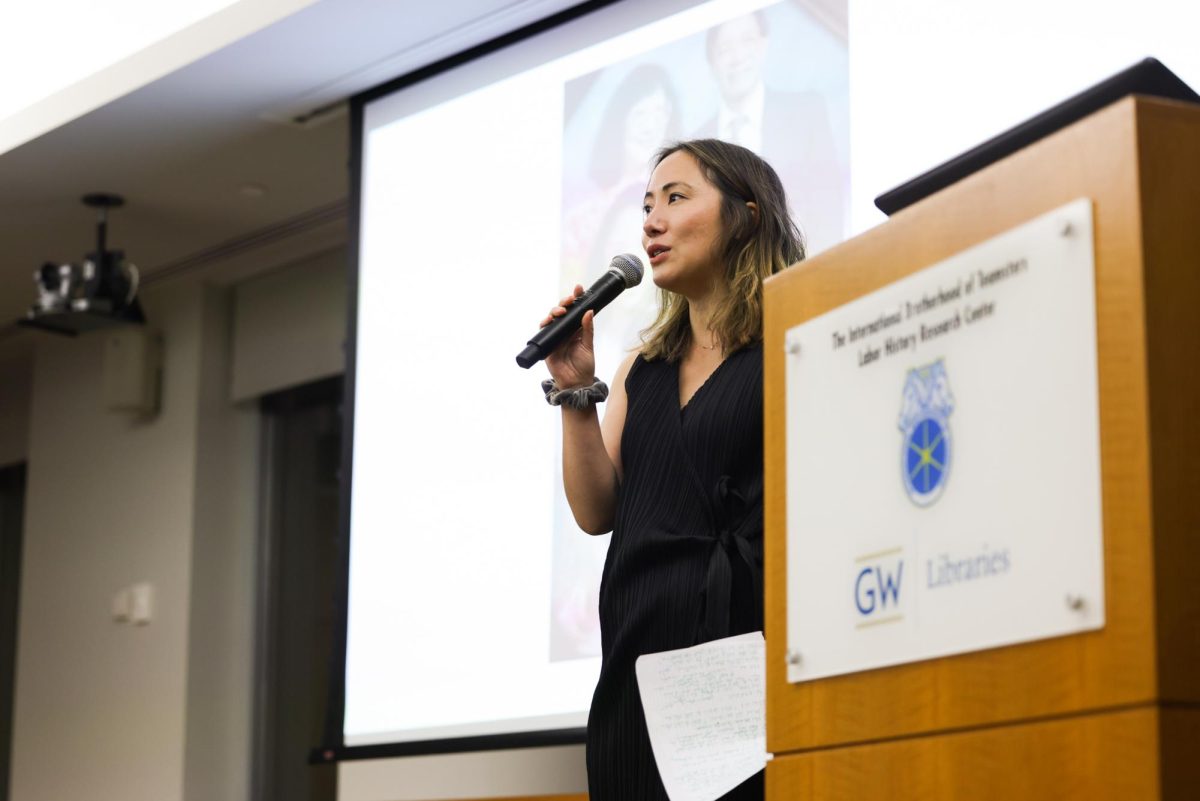Corrections appended
Standing in the sprawling green campground, junior Nicole Banton watched a little girl, once terrified of heights, speed through the trees on a zip line.
When Banton first entered the thick woods of the Camp Manidokan in Knoxville, Md – complete with rope courses, cabins and paths to the Potomac River – she knew her experience as a companion counselor to children with cancer would be meaningful.
But she didn’t expect to relish so deeply her camper’s personal victories. “I got to know my camper so well over the week. We’ve e-mailed every day since camp ended,” Banton said.
Banton was part of the first group of GW students to host their own Camp Quality in early August, a free week-long summer camp for a half-dozen children with cancer.
The GW chapter of Camp Quality, which was founded in 2010 by Joanna Falk and Shivali Choxi, is the first university to partner with the national program. Camp Quality USA has 16 camps across the country, and has operated in the United States since 1986.
Senior Sabrina Chugani and junior Katie Black – the GW group’s incoming executive directors – helped run the chapter’s first summer camp this month at Manidokan Camp & Retreat Center after securing money for the program and recruiting two GW counselors over the last year.
“It means something to me to see a group of people coming together and moving obstacles to put together a camp that means so much to these kids and changes the way they look at the disease that they have,” said Chugani, who was spurred into action after she lost both her grandfathers to cancer.
Camp Quality’s day-to-day activities hardly deviate from those of standard childhood summer programs. Campers swim, hike, paint, go rafting and watch performances of jugglers and magicians.
Then for one hour every day, campers must rest from the high-energy activities.
“A lot of these kids come from immunity-conscious households, and for many of them, activities like swimming or rafting are new experiences,” Black said, adding that the camp mandates an on-site medical staff.
The organization faced hurdles in its first two years, unable to secure a campground and run the program until this year. The program initially struggled to gain credibility among parents of prospective campers, Black said, as families were reluctant to put their children in the hands of college students.
To assuage parents’ uncertainties, the program hosted a family day last year, run by Shivali Choxi and Joanna Folk, to introduce GW’s chapter, offering a free day of swimming, rock climbing and other traditional camp activities.
Parents were also introduced to the camp’s unique counselor system: Each camper is paired with a companion counselor, ensuring more personalized attention. Other companion counselors came from James Madison University and Virginia Commonwealth University. Many of the kids came from Ohio, and had previously attended a Camp Quality chapter there.
Every camper this year was in remission, Black said, but companion counselors had to be conscious of campers’ personal limits and backgrounds with potential grave health concerns.
“We really want the kids to have the best possible time and get the personal attention they deserve,” Black said. “In some cases, campers are coming straight from the hospital, getting clearance for the week to come to camp.”
Committed to keeping the program free of charge for campers, GW’s group organized campus-wide fundraisers, leaving coin jars stationed across Foggy Bottom businesses. While most students were studying in Gelman Library during finals week, Chugani said she was drafting and submitting grant applications.
As the program enters its third year, Chugani and Black said they hope to recruit more GW participants and expand the camp’s capacity for more kids by continually holding fundraisers.
“In all of the craziness that these kids are dealing with – spending nights in hospitals, spending weeks going through chemotherapy, things that a young child really should not have to be dealing with – our goal is to provide them with a week where they can feel like a normal kid again,” Chugani said.
This post was updated Aug. 30 at 3:23 p.m. to reflect the following:
Due to reporting errors, The Hatchet misspelled Nicole Banton’s name and misreported the number of camps nationally run by Camp Quality.
Due to misinformation from a source, The Hatchet reported that many, not all, of the campers were from Ohio, and that not all the campers were in remission. Additionally, The Hatchet reported that executive directors Sabrina Chugani and junior Katie Black spearheaded this year’s camp. The incoming leaders were still being trained by 2012-2013 directors at the time. Also due to misinformation, The Hatchet also reported that the organization raised a total of $15,000 and the types of donations it received.





